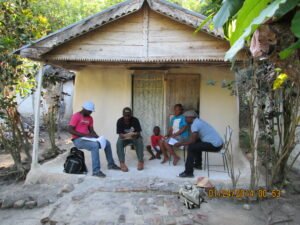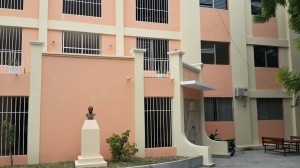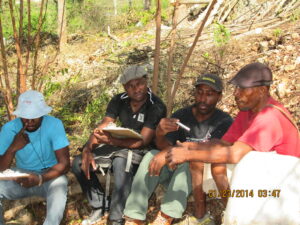A Case Study of Dissertation Research Collaboration in Rural Haiti – Part 1 of 4
Andrew Tarter is a Ph.D. candidate in sociocultural anthropology at the University of Florida. He received a Wenner-Gren Dissertation Fieldwork Grant in 2012 to aid research on ‘The Tree Farmers of Haiti: Understanding Factors that Influence Farmers’ Retention of Forest Land in Southern Haiti,’ supervised by Dr. Gerald F. Murray. Tarter is also a National Science Foundation (NSF) Graduate Research Fellow and his research has additionally been supported by the Fulbright Program and the National Endowment for the Humanities. Over the course of his fieldwork in Haiti, Tarter has worked extensively with students from L’Université d’État d’Haïti (State University of Haiti) a recipient of the Wenner-Gren Institutional Development Grant. Andrew joins us today to guest-blog the first of a four-part series reflecting on his collaboration with Haitian students and the myriad benefits and challenges of collaboration within the field setting.

Haiti is a hotbed of social science research. As a subscriber to Google Scholar Alerts on anything related to Haiti, I am continually astounded at the sheer volume of Haiti-based research that continues to be produced. Anecdotally I know of no less than six anthropology doctoral students currently in Haiti, collecting data for their dissertations. I have received numerous emails over the past few years from new or incoming anthropology graduate students who intend to work in Haiti. Several recent PhDs and senior anthropologists continue visit Haiti every year, usually during the summer months. At least two well-known anthropology PhDs have made Pòtoprens (Port-au-Prince) their permanent home—one for the last 40 years. Several universities lead undergraduate study-abroad trips to Haiti every year. I recently hosted a tenured associate professor of anthropology who is interested in shifting his research to Haiti. Suffice to say, Haiti has no shortage of visiting anthropology undergraduates, graduate students, doctoral students, senior researchers, and resident anthropologists. In all cases numerous opportunities exist for collaboration with counterparts at the Faculté d’Ethnologie (Department of Ethnology; FE) at the L’Université d’État d’Haïti (State University of Haiti; UEH).

My own recent experience working alongside three anthropology and sociology undergraduates from UEH was both a dream-come-true and a challenge. I had previous experience leading an interdisciplinary team of students from the University of Florida to Haiti on a 10-day expedition to conduct research on plant diversity and local plant uses. But this was different: I was embarking on new terrain in an effort to recruit three Haitian scholars to leave the capital and go work in a remote part of the country—under physically demanding circumstances—for nine months. When reviewing my initial research proposal, more than one of my academic advisors cautioned against working with educated urbanites. Rather, they suggested, I should hire assistants from the rural research site, as they are locally integrated and know the land better. I wrestled with these two options, but ultimately chose to recruit and collaborate with students from UEH for two primary reasons: (1) they have training in social theory and methods absent in members of the village; and (2) the experience, while just a temporary job to villagers, could serve as a springboard to future academic opportunities for the UEH students.
In this first post of a four-part blog series, I begin a sequential reflection of the entire course of events, from connecting with faculty and students from FE, to some of the challenges faced in the rural countryside by our research team. While I advocate for continued research partnerships—contextualized through the exemplar of my interactions with faculty and students at FE—I also provide a blueprint of collaboration through a series of suggestions that could be applicable to future social science researchers from other disciplines who wish to collaborate with corresponding researchers and departments at UEH.
The Costs of Collaboration
I am painfully aware of the challenges many anthropology doctoral students face in securing funding. My own initial dissertation grant applications were all turned down, but with persistence and guidance during the Summer Institute in Research Design, I was able to craft a compelling research proposal. In the end, I was very fortunate: my dissertation research was supported by both the Wenner Gren Foundation and the National Science Foundation. This public-private funding collaboration allowed for long-term research and partnership with three students—a unique situation that may not be available to all researchers visiting Haiti under a variety of different circumstances. Nevertheless, there are multiple opportunities and advantages to collaborating with members of the Faculté d’Ethnologie, irrespective of funding status, which I touch upon in the paragraphs that follow.
The Benefits of Collaboration
Collaborating with faculty and students from Faculté d’Ethnologie is not a requirement. I know several anthropology doctoral students who have conducted research in Haiti, successfully collecting data and returning to write their dissertations without ever visiting the Faculté d’Ethnologie campus. Likewise, many senior researchers do not collaborate with FE. Not all research designs or research objectives require collaboration; however, collaborating provides numerous advantages for researchers, including:
- New friendships and meaningful relationships;
- Income from research positions that provide a stipend, per diem, or salary;
- Collaborating on short- and long-term research projects or initiatives;
- Collaborating on funding projects;
- Receiving letters of recommendation from researchers that students can use to pad CVs and leverage further opportunities;
- Assistance in translating important documents;
- Assistance applying to foreign universities;
- Assistance applying to foreign funding sources;
- Accessing important or hard-to-find documents;
- Feedback from non-Haitian anthropologists on their research; and
- The opportunity to practice and improve their language skills, depending on the language(s) of the PI.
This is hardly an exhaustive list; benefits to research collaboration don’t end here. Each case of collaboration is unique and will present its own challenges and benefits. Furthermore, none of these benefits are guaranteed: they rely to a large extent on good-faith efforts by all parties involved. Below I highlight some steps to ensure fruitful collaboration, contextualized through anecdotes from my own personal experience. This is not a recipe that needs to be followed step-by-step, nor a guaranteed roadmap to attainment, but rather a tentative schedule for collaborative success.
It is entirely probable and quite likely that another researcher has come before you, and has experience and relationships with faculty members in an affiliated UEH department. My initial introduction to anthropology faculty at UEH was facilitated by another anthropologist—Dr. Mark Schuller. Reaching out to UEH faculty through another researcher is a good strategy depending on that researcher’s relationship with said faculty. Luckily, Mark has great rapport with Faculté d’Ethnologie—he’s been an affiliate since 2003, and has taught multiple courses there.
Mark introduced me via email to Drs. Jhon Picard Byron (Chef Département Anthropologie-Sociologie), Ilionor Louis, (Chef Département des Sciences de Développement), and Jean-Yves Blot (Vice-Recteur à la Recherche). After initial introductions and a series of phone conversations, I passed on a synopsis of my proposed research, which was circulated among students who are finisan (finished with their coursework) or memoran (students who have had their thesis proposal approved). A date and time was arranged to visit campus to meet faculty and conduct interviews with interested students.
2. Visit the campus
My experiences during a Fulbright placement within the Haitian government the prior year wrongly led me to imagine the Faculté d’Ethnologie campus as a perilous place. I distinctly remember the expression of horror on the face of my point-of-contact in the US Embassy at my suggestion of collaborating with Faculté d’Ethnologie for the academic component of my Fulbright placement. She claimed the campus was the starting point of many violent protests, and that a volley of rocks greeted a recent visit by the Haitian President. I was forbidden to collaborate with Faculté d’Ethnologie.

A year later, and a few moments after arriving on the campus, I was reminded how out-of-touch the US Embassy can be. I was not greeted by any rocks, but instead by a courtyard of relaxed students gathering here and there under the shade of a leafy green canopy, engaging in impassioned debates about politics and history, or shuffling off to attend class. No one even seemed noticed me. Eventually Jean-Yves Blot spotted me and we made our introductions. He handed me a large stack of manila envelopes containing CVs of approximately 20 students interested in the three research positions. Blot led me to an empty classroom, and told me that the students would soon meet me there for interviews. As he left he asked me to give an impromptu presentation of my research to his class when the interviews were over.
After the interviews I sought out Blot to honor my agreement to present my research to his class of anthropology students. As an academic, the opportunity to discuss one’s research comes up often enough to have polished sound bites on hand. What I hadn’t expected was the loss of my voice; after about 3 hours of interviewing, during which I often had to give a presentation of the research, my voice had nearly left me. Luckily it held together long enough to give a 30 minute presentation. Researchers interested in presenting or attending presentations at UEH can connect through the department’s Facebook page listing colloquia and other events: Faculté d’Ethnologie Colloque Et autres activités.
I highly recommend taking the time to spread interviews out over a few days. Both you and the students will feel less rushed, and you’ll have more time to thoroughly review CVs and ask important questions. In spite of my rushed experience, I left Faculté d’Ethnologie happy and wondering why I hadn’t connected with faculty and students long ago.
